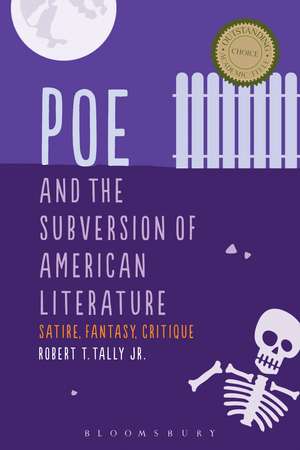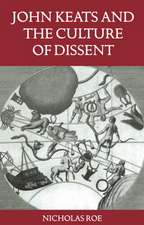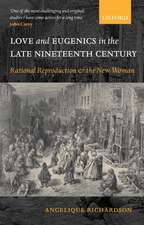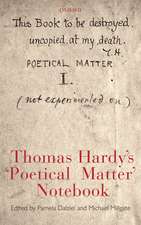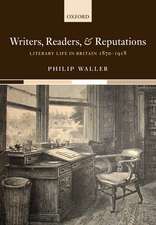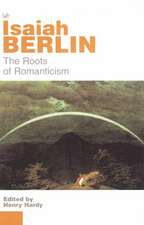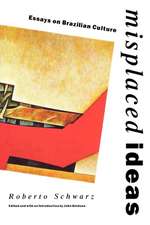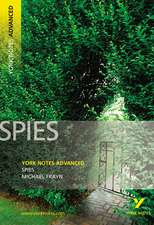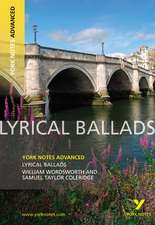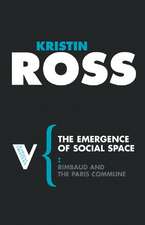Poe and the Subversion of American Literature: Satire, Fantasy, Critique
Autor Dr Robert T. Tally Jr.en Limba Engleză Hardback – 12 mar 2014
| Toate formatele și edițiile | Preț | Express |
|---|---|---|
| Paperback (1) | 183.70 lei 6-8 săpt. | |
| Bloomsbury Publishing – 21 oct 2015 | 183.70 lei 6-8 săpt. | |
| Hardback (1) | 771.36 lei 6-8 săpt. | |
| Bloomsbury Publishing – 12 mar 2014 | 771.36 lei 6-8 săpt. |
Preț: 771.36 lei
Preț vechi: 1111.49 lei
-31% Nou
Puncte Express: 1157
Preț estimativ în valută:
147.60€ • 154.52$ • 122.13£
147.60€ • 154.52$ • 122.13£
Carte tipărită la comandă
Livrare economică 05-19 aprilie
Preluare comenzi: 021 569.72.76
Specificații
ISBN-13: 9781623564278
ISBN-10: 1623564271
Pagini: 160
Dimensiuni: 153 x 234 x 18 mm
Greutate: 0.39 kg
Ediția:New.
Editura: Bloomsbury Publishing
Colecția Bloomsbury Academic
Locul publicării:New York, United States
ISBN-10: 1623564271
Pagini: 160
Dimensiuni: 153 x 234 x 18 mm
Greutate: 0.39 kg
Ediția:New.
Editura: Bloomsbury Publishing
Colecția Bloomsbury Academic
Locul publicării:New York, United States
Caracteristici
Argues for an otherworldly approach to world literature, incorporating satire, fantasy, and criticism
Notă biografică
Robert T. Tally Jr. is Associate Professor of English at Texas State University, USA, where he teaches American and world literature.
Cuprins
Acknowledgements Introduction: A Poetics of Descent 1. Subterranean Noises Undercurrents of American Thought The Man of the Street The Diddler's Grin 2. A Nomad in a Land of Settlers The Early Poe: Nomadic Peripety The Mature Poe: Unsettling Movement The Late Poe: Extravagant Trajectories 3. Points of No Return The Return of Personal Narrative "Of my country and of my family I have little to say" Irreversible Descent Uncharted Territories 4. The Nightmare of the Unknowable The Legitimate Sources of Terror Terror as Anti-Epistemic Unfathomability 5. Captivating the Reader Perverse Designs "To be appreciated you must be read" The Apparatus of Capture 6. The Perverse Originality of Literature Proper True Originality Generic Ambiguities 7. The Cosmopolitan's Uncanny Duplicity At Sea in the City The Doppelgänger's Mirror Image 8. Extra Monia Flammantia Mundi: Satire, Fantasy, and the Critic's Laughter Phantasy Pieces The Laugh of Edgar Allan Poe Conclusion: Premature Burials BibliographyIndex
Recenzii
Tally (Texas State Univ.) follows up his Kurt Vonnegut and the American Novel with a tightly argued treatment of Edgar Allan Poe as a subversive counter voice to the traditional American story of progress, expansion, and upwardly moving achievement. Most earlier discussion of Poe as a satirist focused on his fiction; Tally includes Poe's poetry, essays, and reviews. An Americanist at heart, Tally contrasts Poe's voice with the voices of Melville, Emerson, and Thoreau. The result is a brilliant rethinking of Poe's work that will influence study of mid-19th century American literature for some time. Primarily of interest to specialists, but ambitious undergraduates could handle it. The bibliography and index are thorough. Summing Up: Highly recommended. Upper-division undergraduates through faculty.
This study stands out not only for its analysis of Poe, but also for its contribution to genre theory as well as its critique of American Studies ... With this book, Tally becomes Poe Studies' most valuable player.
Not since Louis Renza's important revisionary study, Edgar Allan Poe, Wallace Stevens, and the Poetics of American Privacy (2002), has there been a book devoted to Poe (in whole or in part) and his place in the institution of American Literature like Robert T. Tally Jr.' s Poe and the Subversion of American Literature: Satire, Fantasy, Critique. And Tally's book, solely on Poe, has the advantage of being able to demonstrate for the entire career how Poe systematically subverts the exceptionalist myth of America's manifest destiny via his fiction, criticism, and poetry. No other study has achieved such a depth and scope of critical demonstration with respect to Poe, going back even further, perhaps, for decades. It is very likely to shake up American Studies, as well as rightly to put Poe and his all-encompassing irony once again at the symbolic heart of modern literature. One of the best books I have read in a long time.
Theoretically rich and empirically compelling, Tally's study makes a knock-down case for Poe the Descendentalist: anti-American unmaker of epistemologies, cities, democracies, missions, selves, narratives. Reading across a wide range of literary genres, Tally conjures up a subterranean Poe, nomadic Poe, oceanic Poe, Deleuzian Poe, streetwalking Poe, slyly calling the poète maudit back from his premature burial to erupt in an afterlife of perverse joyous mockery. This study forever makes the stately apparatus of American Studies fall back into the worldly maelstrom of Poe's uncanny figurations.
Poe and the Subversion of American Literature makes an important contribution to both classic and ongoing conversations about what might constitute a national literature in the United States. Robert Tally explores what is "anti-American" in Poe's opposition to conventional notions of national self-formation. In Poe's spirit of prankishness, Tally provocatively argues in this fascinating and accessible book, we see satire and mockery as the best elements of an American literary tradition.
Robert Tally's brilliant new book on Poe restores him to his prominent place in the development of American literature and honors his transgressive achievement. Tally is not just an astute critic but also a wonderful, finely honed writer, and his book will be required reading for Poe scholars and fans alike.
[A] breath of fresh air in Poe studies ... Poe and the Subversion of American Culture places Poe's dissenting voice right in the center of the American tradition, but that voice, full of derisive laughter, continues to resist easy classification or control ... Ultimately, this impressive book reminds us of just how much complexity Poe offers to readers, continuing to undercut and mock every prevailing narrative of American literature. As such, the book is essential for anyone interested in Poe studies, American literature, and American studies.
This book is one of the most significant contributions to Poe studies in recent scholarship ... Yet just as Tally argues that Poe's oeuvre is too broad to fit easily into any single genre, Tally's book is not limited to any one field of study. His treatment of Poe, in fact, lends itself to scholarly investigations of the Gothic, as well as humour, American popular culture, and problems of genre. The strength of Tally's overall argument is this comprehensiveness. Uniquely grounded in high theory and philosophy ranging from Plato to Nietzsche, Poe and the Subversion of American Literature gathers rhetorical support from a diverse range of thought, challenging conventional understandings of Poe's work.
This study stands out not only for its analysis of Poe, but also for its contribution to genre theory as well as its critique of American Studies ... With this book, Tally becomes Poe Studies' most valuable player.
Not since Louis Renza's important revisionary study, Edgar Allan Poe, Wallace Stevens, and the Poetics of American Privacy (2002), has there been a book devoted to Poe (in whole or in part) and his place in the institution of American Literature like Robert T. Tally Jr.' s Poe and the Subversion of American Literature: Satire, Fantasy, Critique. And Tally's book, solely on Poe, has the advantage of being able to demonstrate for the entire career how Poe systematically subverts the exceptionalist myth of America's manifest destiny via his fiction, criticism, and poetry. No other study has achieved such a depth and scope of critical demonstration with respect to Poe, going back even further, perhaps, for decades. It is very likely to shake up American Studies, as well as rightly to put Poe and his all-encompassing irony once again at the symbolic heart of modern literature. One of the best books I have read in a long time.
Theoretically rich and empirically compelling, Tally's study makes a knock-down case for Poe the Descendentalist: anti-American unmaker of epistemologies, cities, democracies, missions, selves, narratives. Reading across a wide range of literary genres, Tally conjures up a subterranean Poe, nomadic Poe, oceanic Poe, Deleuzian Poe, streetwalking Poe, slyly calling the poète maudit back from his premature burial to erupt in an afterlife of perverse joyous mockery. This study forever makes the stately apparatus of American Studies fall back into the worldly maelstrom of Poe's uncanny figurations.
Poe and the Subversion of American Literature makes an important contribution to both classic and ongoing conversations about what might constitute a national literature in the United States. Robert Tally explores what is "anti-American" in Poe's opposition to conventional notions of national self-formation. In Poe's spirit of prankishness, Tally provocatively argues in this fascinating and accessible book, we see satire and mockery as the best elements of an American literary tradition.
Robert Tally's brilliant new book on Poe restores him to his prominent place in the development of American literature and honors his transgressive achievement. Tally is not just an astute critic but also a wonderful, finely honed writer, and his book will be required reading for Poe scholars and fans alike.
[A] breath of fresh air in Poe studies ... Poe and the Subversion of American Culture places Poe's dissenting voice right in the center of the American tradition, but that voice, full of derisive laughter, continues to resist easy classification or control ... Ultimately, this impressive book reminds us of just how much complexity Poe offers to readers, continuing to undercut and mock every prevailing narrative of American literature. As such, the book is essential for anyone interested in Poe studies, American literature, and American studies.
This book is one of the most significant contributions to Poe studies in recent scholarship ... Yet just as Tally argues that Poe's oeuvre is too broad to fit easily into any single genre, Tally's book is not limited to any one field of study. His treatment of Poe, in fact, lends itself to scholarly investigations of the Gothic, as well as humour, American popular culture, and problems of genre. The strength of Tally's overall argument is this comprehensiveness. Uniquely grounded in high theory and philosophy ranging from Plato to Nietzsche, Poe and the Subversion of American Literature gathers rhetorical support from a diverse range of thought, challenging conventional understandings of Poe's work.
